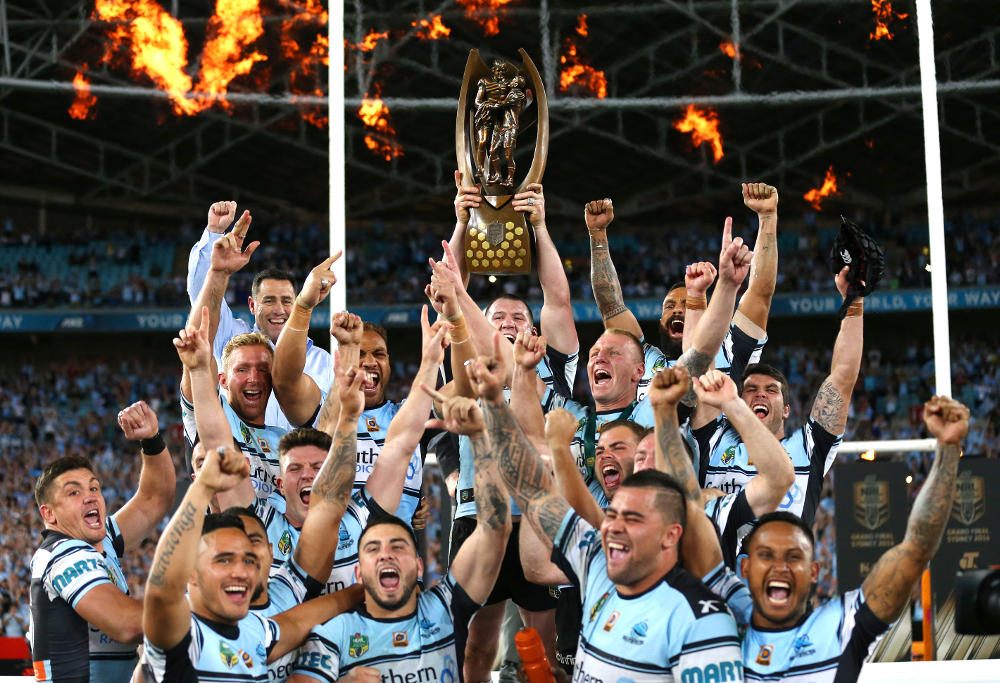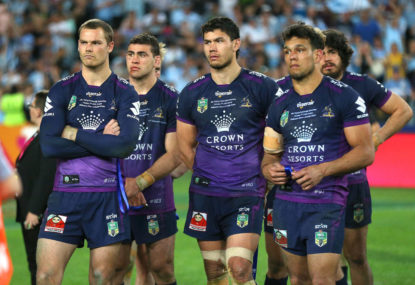Is it really possible to successfully predict the winner of the National Rugby League Premiership prior to Round 1?
Yes.
Is it really possible to successfully predict the winner of the National Rugby League Premiership prior to Round 1 every year?
Yes!
By analysing the previous winners this century we are able to clasp a defined set of similar characteristics together, and the teams that are short listed are often not what you would expect.
We start with the 16 NRL teams and by utilising a process of elimination we are able to put aside our initial short list that meets the basic criteria. We continue with this process until we are left with a set of teams and one of these will win the competition.
Many fancied and high-profile teams have already been eliminated by this point and this is when skeptics will doubt the method in the madness.
Call it what you want but with a record of 16/16 it is accurate madness.

It is crucial that the nominated factors are all able to be measured clearly. They must be black and white. When we have grey and the measurement can often be an opinion, it leaves room for fudging.
Here is a good example.
In predicting the next President of the U.S. political analyst and historian Allan J. Lichtman presents thirteen historical factors, or ‘keys’ (four political, seven performance, and two personality), that determine the outcome of presidential elections.
The esteemed Lichtman is on record successfully predicting the outcome of every presidential election from 1984 and yes, he selected Donald Trump in 2016 – but he rules have many “grey” areas.
I have only relied on facts that cannot be debated and consciously eliminated personalities or any performance that cannot be measured clearly and without any protest.
I firmly believe that the NRL is the toughest competition in the world and that it requires huge endurance. It is almost impossible for any player to get through an entire season playing big minutes in every game and still be 100 per cent fit for the finals. The Storm’s Cam Smith and Cowboy Johnathan Thurston have proven to be exceptions to the rule, but they are both exceptional champions.
Playing representative footy in the off season, including travelling to the U.K. to play in the Club Challenge (and associated matches) has proven to be a “killer”.
Teams have proven to not be able to do both and win the grand final.
The State of Origin is also a major factor and in 2015 Johnathan Thurston was one of the few players to emerge unscathed and maintain his best form. Players like Cam Smith and Cooper Cronk were clearly impacted by Origin that year but the Storm trainers found a way to freshen them up in 2016 by resting them early in the week.
The Origin is so intense that teams with a heavy representation often struggle and this can make it difficult to finish the home-and-away season in the top four, like the Broncos in 2016. The New Zealand Warriors historically thrive during and just after the Origin period as they are normally not represented. These figures will continue to be more pronounced as club games, and especially Origin, increases with intensity.
How much more can the human body take?
The best team does not always win the grand final, as injuries and the abilities of clubs to delve into their back up depth is crucial, and will become more so in the future.
To find the 2017 Premiership winner we start by eliminating teams that do not meet crucial criteria.
1. Eliminate the Premiers (Sharks)
a. The salary cap has made it too difficult for any team in the modern era to go back to back
b. When a team wins the Premiership many players have to excel and this automatically means that their values increase and they either have to leave the club or other fringe players must go which weakens a team’s depth when injuries occur.
2. Eliminate teams that have played in a Club Challenge or associated game in the UK in the off season (Sharks, Broncos)
a. Bart Cummings wanted his Melbourne Cup runners to have a certain number of “miles in their legs” to be ready and fit to run 3,200m, but with the NRL it is the opposite.
b. The NRL champion plays the UK Super League Champions in the Club Challenge in the off season and no team has been able to travel to the UK and return to win the NRL competition this century. This has included up to three teams in recent years.
c. The Club Challenge was once considered a “friendly” match but no more. The NRL teams take it seriously and “go to the well” which has proven to be impossible to produce a repeat performance later in the year. The astute Melbourne Storm, grand finals runners up, announced they would not be participating due to it interfering with their pre-season.
3. Eliminate any team that does not have a proven Origin or International class half (Raiders, Titans, Eels, Panthers, Dragons, Tigers)
a. Only one team, the Broncos in 2006, has won a Premiership without an Origin class halfback, but his number 6 was the champion Darryn Lockyer.
b. In the interests of “Black and White” measurements, we have included the term ‘Class half’ and not just ‘halfback’. Ideally, we are looking for a true organiser with top class last tackle options.
4. Eliminate any team that does not finish in the top three teams in the season
a. There have been 20 seasons between the two codes where the current final eight system has been used.
b. The grand final winner has come from within the top three teams after the home-and-away season 100 per cent of the time – stunning fact, but true.
c. Many would question why the fourth placed team should be inferior to the third placed team.
In the first week of the finals 1v4, 2v3, 5v8, 6v7 has shown that the team finishing higher on the ladder wins more often.
1) 72 per cent v (4) 28 per cent
2) 72 per cent v (3) 28 per cent
Teams one, two, five and six all have home ground advantage in week one and have all won 60 per cent or more of their respective games.
The grand final has been won by:
Team 1 7 times 35 per cent
Team 2 7 times 35 per cent
Team 3 6 times 30 per cent
Every grand final has been won by teams one through three.
So prior to Round 1 kick off we have eliminated 50 per cent of the teams including the high profile Sharks, Broncos, Raiders and Panthers. Others teams that do not meet the criteria are the Titans, Eels, Dragons and Tigers.
That means the 2017 NRL premiership can only be won by one of the following: Cowboys, Storm, Warriors, Bulldogs, Roosters, Sea Eagles, Rabbitohs and Knights.
To find the winner you will have to wait until after Round 26 until we know who the top three teams are, the winner will be one of them and not come from our eliminated list.
And that’s a fact!






























































































